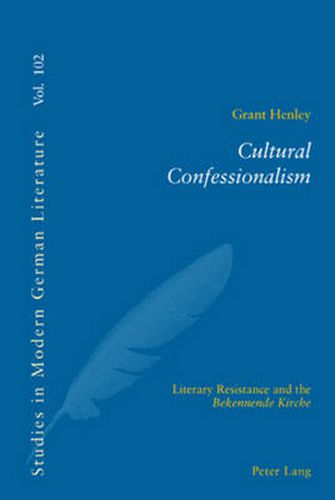Readings Newsletter
Become a Readings Member to make your shopping experience even easier.
Sign in or sign up for free!
You’re not far away from qualifying for FREE standard shipping within Australia
You’ve qualified for FREE standard shipping within Australia
The cart is loading…






Pastor Martin Niemoeller, popular author Ernst Wiechert, and the young theologian Dietrich Bonhoeffer were well known in the public sphere in Germany when Hitler came to power in 1933. As the decade of the 1930s progressed each of these figures became a vocal opponent of National Socialism. In the last twenty-eight sermons delivered before his arrest in 1937 Martin Niemoeller revitalized Protestant homiletic discourse as a political tool in defiance of the regime. Having protested Niemoeller’s imprisonment, Ernst Wiechert was arrested by the Gestapo and incarcerated at Buchenwald for three months during the summer of 1938. Wiechert chronicled his experiences in the fictional autobiography Der Totenwald (1939) - a text which marks the apex of Wiechert’s literary turn from Blut und Boden Dichter to outspoken critic of Nazism. Dietrich Bonhoeffer, a member of the Pastors’ Emergency League and for a time pastoral assistant to Martin Niemoeller, constructed a sphere of textual resistance in his prose and poetic writings composed while imprisoned in Tegel from 1943 to 1945. This study traces the emergence of cultural confessionalism as a new literary resistance paradigm that developed out of the ideological nexus of cultural Protestantism and the confessionalist trend of the Kirchenkampf. Through literary analysis of sermons by Niemoeller and written texts by both Wiechert and Bonhoeffer the book demonstrates how the textual resistance strategies of the cultural confessionalists varied from the oppositional approaches of the ‘innere Emigration’, the political resistance, and the Christian humanist tradition.
$9.00 standard shipping within Australia
FREE standard shipping within Australia for orders over $100.00
Express & International shipping calculated at checkout
Pastor Martin Niemoeller, popular author Ernst Wiechert, and the young theologian Dietrich Bonhoeffer were well known in the public sphere in Germany when Hitler came to power in 1933. As the decade of the 1930s progressed each of these figures became a vocal opponent of National Socialism. In the last twenty-eight sermons delivered before his arrest in 1937 Martin Niemoeller revitalized Protestant homiletic discourse as a political tool in defiance of the regime. Having protested Niemoeller’s imprisonment, Ernst Wiechert was arrested by the Gestapo and incarcerated at Buchenwald for three months during the summer of 1938. Wiechert chronicled his experiences in the fictional autobiography Der Totenwald (1939) - a text which marks the apex of Wiechert’s literary turn from Blut und Boden Dichter to outspoken critic of Nazism. Dietrich Bonhoeffer, a member of the Pastors’ Emergency League and for a time pastoral assistant to Martin Niemoeller, constructed a sphere of textual resistance in his prose and poetic writings composed while imprisoned in Tegel from 1943 to 1945. This study traces the emergence of cultural confessionalism as a new literary resistance paradigm that developed out of the ideological nexus of cultural Protestantism and the confessionalist trend of the Kirchenkampf. Through literary analysis of sermons by Niemoeller and written texts by both Wiechert and Bonhoeffer the book demonstrates how the textual resistance strategies of the cultural confessionalists varied from the oppositional approaches of the ‘innere Emigration’, the political resistance, and the Christian humanist tradition.